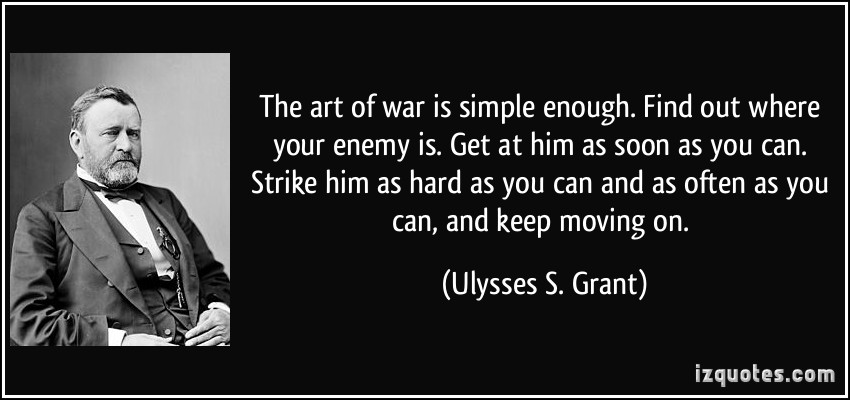Brands, H.W. The Man Who Saved the Union: Ulysses Grant in War and Peace, Doubleday, New York, 2012 (736pp.$35)
General Grant, for a long time, was the lone northern officer who understood and accepted the dire consequences of modern, industrialized warfare, among which were hundreds of thousands of dead, maimed and disfigured men; millions of dead, maimed and disfigured horses; thousands and thousands of bereft families whose dead soldier sons, fathers, and brothers would never be found, much less buried or even identified; and an ambiguously opaque battlefield that stank of bloody mud overhung by shattered trees. Only Lee in the South, in mid-1863, began to share his respected foe’s understanding and acceptance, though in Lee’s case the understanding that war pitted societies against each other (and not warriors), doomed his own cause.
His Christian name was Hiram Ulysses, though an error by a clerk at West Point turned him into Ulysses S., an eponymously mistaken identity for one of America’s great heroes. From a family of tanners, Hiram turned against his family’s trade, hating its stenches of fat and chemicals as well as its commercial metaphysic and back-breaking tediousness, and as a youngster found a love of horses was where his skills also lay. Mastering horses, traveling and training them in the mid-Ohio valley, Hiram was eventually appointed to West Point when another candidate declined the position.
As a young second lieutenant he wooed, much like Lincoln, a woman above his station from a family of slaveholders, and when posted to the rainy, drizzly Pacific Northwest, isolation drove him to whiskey. When he finally married Julia Dent, his passion for her lasted a lifetime.
H.W. Brands new biography of Grant relies for its substance mainly on official government records, Grants own memoir, the memoirs and diaries of political and military leaders of the time, and letters. As the Dickson Allen Anderson Centennial professor of History at the University of Texas, Brands has published books about Teddy and Franklin Roosevelt, among many other distinguished works. Solid but not spectacular, documentary rather than discursive, Brands’ book un-scrolls in clockwork fashion, leaving no doubt in the reader’s mind where the writer’s sympathy lodges: With Grant, who found his higher calling in the military while serving under Zachary Taylor in the Mexican War.
Out of the Army in the 1850’s, Grant failed at farming, business and trade, and wound up managing his wife’s family farm with its slaves, a most unhappy circumstance. War saved Grant, just as peace nearly destroyed him. In Mexico, in a valley outside Matamoros, Grant came under fire for the first time and found that he had the nerve to manage men, to discipline them by example, and to organize the logistics of that implacably opaque battlefield so characteristic of modern warfare. When the Civl War came along Grant got back into the military, and impressed his superiors with his courage and resolve.
After Vicksburg, Grant took charge and found generals like himself (Sherman and Sheridan) who could look on those thousands of dead and maimed soldiers and go on. “He’s got git,” Lincoln said of him, and he was right. Grant couldn’t help but fail as a president. Unsuited to politics in the Gilded Age, he immediately fell afoul of a gold scandal involving one of his family members when Jim Fiske attempted to corner the market. Patronage befuddled the president, as did dealing with a resurgent white supremacist South, though he did attempt to enforce the rights of blacks under the Fourteenth Amendment.
His Indian policy was enlightened, but slated by history to fail, and the decade-long depression of the 1870’s, with its labor strife and political and social turmoil (this lasted well into the 1890’s), was beyond his capacity to cope. He muddled along under the influence of charlatans and hacks in his cabinet, going so far as to advocate for metal money and against paper, further deepening the economic woes of the country. Late in life, suffering from cancer, desperate for money, he wrote his memoirs that, published by Mark Twain’s company, were and are regarded as a timeless, enduring and transcendent classic.
Brands is right to wonder in his introduction what good a new biography can be when there have been hundreds before it, when every decade another two or three appear, which, coupled with the hundreds and hundreds of books about the Civil War, its generals, battles, campaigns and politics, inundate the libraries. “The Man Who Saved the Union” is two-thirds quotes from original sources, and it moves swiftly from episode to episode, lending its pages the virtue of readability.
Lee once appraised Grant, describing his “indomitable will and untiring persistency, his direct method of waging war by delivering constant and heavy blows upon the enemy’s front, rather than seeking advantage through strategical maneuver…” The same can be said for Brands’ new biography, which is unsubtle but direct.


